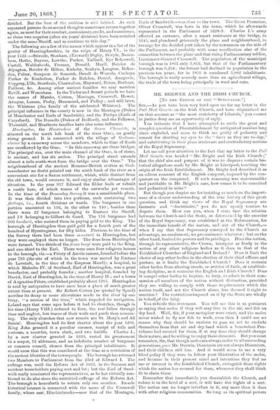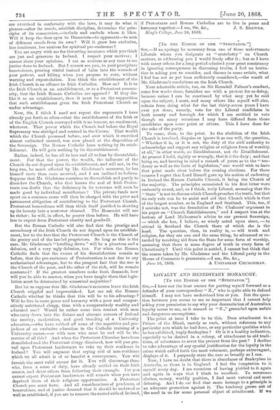MR. BREWER AND THE IRISH CHURCH.
[To THE EDITOR OF THE "SPECTATOR."] SIR,—As you have been very hard upon inc for my letter in the Pall Mall Gazette on the Irish Church, and have stigmatized me on that account as "the most crotchetty of Liberals," you cannot in justice deny me an opportunity of reply.
You intimate that I have attempted to settle the great and complex question of Dismtablishinent by antiquated maxims long since exploded, and seem to think me guilty of pedantry and conceit for shutting my eyes to the "facts as they are to-day," and substituting in their place irrelevant and contradictory notions of the Royal Supremacy.
Let me call your attention to the fact that my letter to the Pall Mall Gazette was headed "Mr. Bright and the Irish Church ;" that the chief aim and purport of it was to disprove certain his- torical allegations made by Mr. Bright at Liverpool, touching the origin of the Irish Establishment. Mr. Bright had described it as an odious remnant of the English conquest, imposed by the con- querors on the conquered. If such reasoning was statesmanlike and justifiable in Mr. Bright's case, how comes it to be conceited and pedautical in mine ?
But though you despise me for insisting so much on the import- ance of a clearer understanding of the true history of this great question, and think my views of the Royal Supremacy are fantastic and "doctrinaire," you do not openly venture to dispute them. How can you, when I state that the relation between the Church and the State, as determinel by the exercise of the Royal Supremacy, was established at the Reformation, for the immediate benefit of the nation, and not of the Church,— when I say that that Supremacy conveyed to the Church no advantage, no emolument, no pre-eminence whatever ; but on the other hand, limited its powers and its privileges. Does the nation, through its representative, the Crown, interpose as freely in the action of any other religious bodies as it does in that of the Established Churches of England and Ireland ? Does it limit the choice of any other bodies in the election of their chief officers and pastors, as it limits the Established Church ? Does it restrain other bodies from altering creeds, or articles of faith, or establish- ing discipline, as it restrains the English ani Irish Church ? Does it compel other bodies to baptize, to bury, to admit to their com- munion all members of the nation without distinction, provided they are willing to comply with those requirements which the nation itself, and not the Church alone, has deemed it right to sanction ? The restrictions imposed on it by the State are wholly in behalf,of the laity.
You ridicule this statement. You tell me this is as pertinent as saying that moles if they will may live in the air, and fish on dry land. Well, Sir, if your metaphor were exact, and the moles never wished to fly nor fish to walk, even then I could see no reason why they should be anxious to pass an act to exclude themselves from that air and dry land which a benevolent Pro- vidence had secured for them, if at any time they should change their nature, and be willing to enjoy these elements. But you must
remember, Sir, that though moles are always moles to all succeeding generations, pace Mr. Darwin, Dissenters are not always Dissenters, and their children still less. And it would seem to me a very blind policy if they were to follow your illustration of the moles, and because in their present mind and intentions they feel no use or interest in the Established Church, extinguish those rights which the nation has secured for them, whenever they shall think fit to claim them.
Remember that immediately you disestablish the Church, and reduce it to the level of a sect, it will have the rights of a sect. The nation can no longer interfere in it, any more than it does with other religious communities. So long as its spiritual powers are exercised in conformity with the laws, it may do what, it pleases—alter its creeds, establish discipline, determine the prin- ciples of its communion,—include and exclude whom it likes. Will it keep the door open to Dissenters—to opponents—to men of different creeds from its own? Will it grow less exclusive, less intolerant, less anxious for spiritual pre-eminence ?
You are angry with me for thwarting measures which you think are just and generous to Ireland. I respect your motives ; I cannot share your opinions. I am as anxious as any man to see justice done to Ireland. But I cannot see you, in your precipitate benevolence, pouring vitriol instead of balm into the wounds of your patient, and killing when you propose to cure, without warning and expostulation. You think the establishment of the Irish Church is an offence to Irish Catholics. How so ? Is it to the Irish Church as an establishment, or as a Protestant commu- nity, that the Irish Roman Catholics are opposed ? If they dis- like it as an establishment, then it must be on the supposition that such establishment gives the Irish Protestant Church an undue advantage.
Now, Sir, I think I need not repeat the arguments I have already put forth so often—that the establishment of the Irish or of the English Church conveyed with it no honour, no emolument, whatever. That power which the Church had before the Royal Supremacy- was abridged and centred in the Crown. That wealth which the Church possessed before, and over which it exercised almost unlimited control, was now placed at the disposition of the Sovereign. The Roman Catholic loses nothing by its estab- lishment. He will gain nothing by its disestablishment.
Rather, indeed, he has all to lose and all to fear by disestablish- ment. For that the power, the wealth, the influence of the Church do not depend upon its establishment, and will not, in the long run, be much affected by Mr. Gladstone's measures, he has himself more than once asserted, and I am inclined to believe. Suppose that Mr. Gladstone contrives to disestablish and partly to diseudow the Church, who that knows the zeal of Irish Protes- tants can doubt that the deficiency in its revenues will soon be made good by individual munificence? The private funds now spent on a common cause will then be charged with the prior and paramount obligation of contributing to the Protestant Church. Protestant benevolence will then think itself justified in shutting up its bounty into a narrower channel. The Romanist will not be richer ; he will, in effect, be poorer than before. He will have less to expect from Protestant charity and goodwill.
But the Roman Catholic will also find that the prestige and ascendancy of the Irish Church do not depend upon its establish- ment, but to the fact that the Protestant Church is the Church of the gentry and of the landed proprietors. So long as this is the case, Mr. Gladstone's "levelling down" will be a phantom and a delusion, and a very ugly delusion, too. For when the Roman Catholic finds that the causes of his dissatisfaction remain as before, that the pre-eminence of Protestantism is not due to any ecclesiastical advantages, but to the pungent fact that the one is the Church of the poor, and the other of the rich, will he remain contented? If the greatest numbers make fresh demands, how will you be able to answer, when you have taught them that legis- lation must be determined by numerical majorities?
But let us suppose that Mr. Gladstone's measures leave the Irish Church crippled and impoverished. Let me ask the Roman Catholic whether he thinks that this will be to his advantage ? Will he live in more peace and harmony with a poor and compar- atively unlettered clergy, than with a comparatively wealthy and educated one ? Would he rather come into contact with men who carry down into the distant and obscure corners of Ireland the suavity, moderation, and good breeding of a University education,—who have rubbed off some of the asperities and pre- judices of an exclusive education in the Catholic training of a University career,—or with men who must be and will be the reverse of all this? And when the Protestant Churches have been demolished and the Protestant clergy dismissed, how will you pre- vail upon Protestant landowners to take up their residence in Ireland ? You will augment that crying evil of non-residence which we all admit is of so baneful a consequence. You will furnish the most valid excuse for it. You will discourage those who, from a sense of duty, have already settled on their Irish estates, and deter others from following their example. For you cannot expect Protestant landowners will remain when you have deprived them of their religious opportunities. A Protestant Church you must have. And all considerations of prudence, of benevolence, and of justice demand that it should be endowed as well as established, if you are to remove the rooted evils of Ireland,
if Protestants and Roman Catholics are to live in peace and



































 Previous page
Previous page